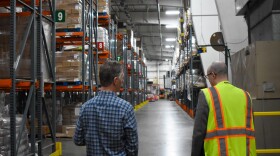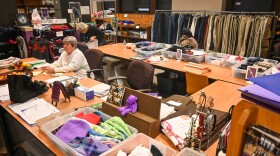-
Ahead of the Thanksgiving holiday, KCUR's Up To Date broadcasted from Harvesters Community Food Network in Kansas City to hear how the organization is managing a time of extremely high demand.
-
Joey Thomas has been sponsoring a turkey giveaway for almost 20 years. But he says this year feels different. Low-income families and businesses are all struggling with higher prices, a long federal shutdown and smaller, delayed SNAP benefits.
-
Federal food assistance has started to flow again after the government reopened. But the charitable food system is planning for continued need through the end of the year.
-
Kansas City area school districts are connecting families with food, clothing and other resources after the federal shutdown exacerbated their financial strain.
-
The longest government shutdown in U.S. history appears to be near an end. But weeks without paychecks and cuts to SNAP benefits put many Kansas Citians in desperate situations — and turning to local support systems like food pantries, mental health services and utility assistance programs.
-
Tens of thousands of Kansas City residents are faced with the consequences of the longest government shutdown in American history. People who rely on food benefits remain without the funding that helps put food on the table, while the area’s many federal workers are furloughed or continue to work without pay.
-
Many Kansas City families are worried about their next meal. The government shutdown has left thousands of federal workers in the metro without a paycheck. At the same time, SNAP benefits have been cut back and delayed. Here’s a list of Kansas City-area pantries and kitchens who are meeting the demand.
-
Food bank staff expect a wave of new demand as millions of Americans are set to lose federal food assistance in November. But they insist that their services alone won’t be enough to feed everyone who relies on the Supplemental Nutrition Assistance Program.
-
Kansas Gov. Laura Kelly is joining Democrats from 24 other states in suing President Donald Trump's administration over the lapsed funding for the Supplemental Nutrition Assistance Program, previously known as food stamps.
-
Employees at Missouri's food banks said the government shutdown's halt of food benefits could put a strain on their organizations, which have already seen an increase in demand this year.
-
State lawmakers must soon decide whether to cover the extra costs to provide food assistance. If they don’t, food banks and pantries alone can’t make up the difference.
-
President Donald Trump’s "Big, Beautiful Bill" shifts more Supplemental Nutrition Assistance Program costs to states. Lawmakers and officials in support of the new measure say it will cut down on waste and fraud, but food advocates warn it could mean fewer people receiving the benefit.
Play Live Radio
Next Up:
0:00
0:00
Available On Air Stations












